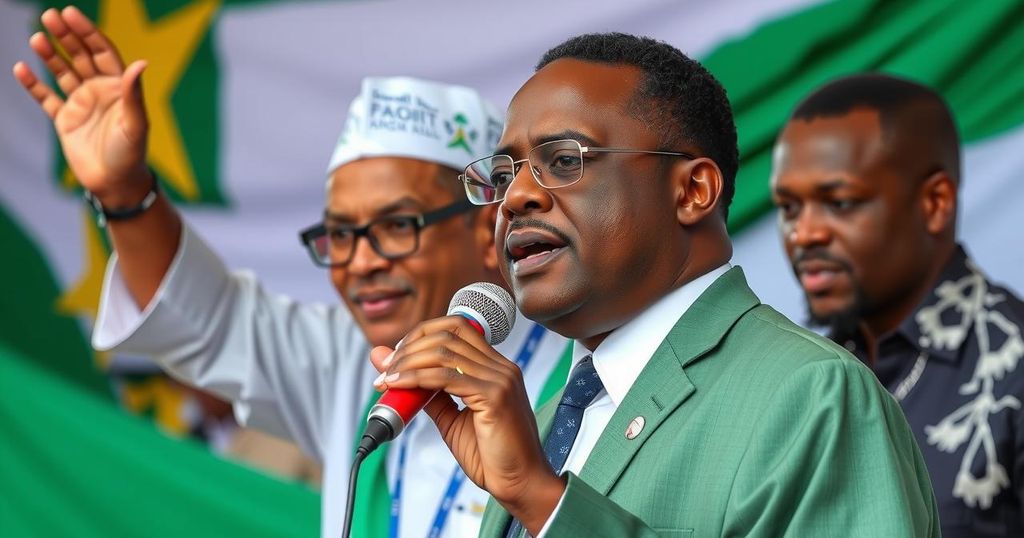World news
2024 ELECTIONS, AFRICA, AP, ASSOUMANI, AZ, AZALI ASSOUMANI, COMO, COMOROS, CONVENTION FOR THE RENEWAL OF THE COMOROS, CRC, DIPLOMATIC RELATIONS, ELECTIONS, ELECTORAL COMMISSION, EUROPE, FRANCE, GOVERNMENT, INDIAN OCEAN, ITALY, MADAGASCAR, MORONI, PRIME MINISTER APPOINTMENT, SUPREME COURT, VOTER TURNOUT
Jamal Robinson
0 Comments
Comoros Ruling Party Maintains Majority in Parliamentary Election
In Comoros’ parliamentary election, the ruling CRC party won 28 of 33 seats, affirming President Azali Assoumani’s majority. The election was boycotted by certain opposition parties citing electoral fraud, and results await confirmation by the Supreme Court. Assoumani has a controversial history of coups and constitutional reforms that favor his continued presidency.
In the recent parliamentary election held in Comoros, the ruling Convention for the Renewal of the Comoros (CRC) party, led by President Azali Assoumani, successfully secured 28 out of 33 available seats. This decisive win allows the CRC to maintain its majority in the national assembly, as announced by the electoral commission. The election results are subject to confirmation by the Supreme Court. Notably, several opposition parties chose to boycott the election, alleging prior instances of electoral fraud by the ruling party.
Comoros, an archipelago located off the eastern coast of Africa, has experienced ongoing political instability since its independence from France in 1975. The region has endured numerous military coups, with President Assoumani first seizing power in 1999 through a coup that targeted the then-president. After a brief period out of office, he re-emerged in the political arena, winning elections in 2016 and subsequently extending his presidency through significant constitutional reforms enacted in 2018 that eliminated term limits and modified the presidential rotation agreement between the islands.
The recent election results reflect the consolidation of power by the CRC and President Assoumani, despite persistent claims of electoral misconduct. Comoros continues to navigate its challenging political landscape, marked by a history of coups and shifting governance structures. The implications of these election outcomes are likely to influence the island nation’s governance and its relations within the region.
The electoral commission announced the results on Tuesday without any specific quotations from involved parties, marking a significant moment in the political journey of Comoros. The opposition parties, which previously accused the CRC of electoral manipulation, remain critical of the process leading to these outcomes.
In conclusion, the ruling CRC’s substantial victory in the parliamentary elections exemplifies the party’s enduring influence in Comoros politics. The atmosphere of contention surrounding the elections, particularly concerning allegations of fraud and legitimacy, poses significant challenges for the nation’s democratic processes. As the Supreme Court prepares to validate the election results, the future political landscape of Comoros hangs in the balance, shaped by both internal dynamics and external pressures.
The Comoros is a small archipelago situated off the eastern coast of Africa, consisting of three main islands. Since its independence from France in 1975, the nation has faced repeated military coups and political instability, which have fundamentally shaped its governance. President Azali Assoumani, a former military officer, has played a central role in the country’s tumultuous political history, first rising to power in 1999. His tenure has been marked by constitutional changes that have enabled him to remain in office beyond typical term limits, raising questions about the robustness of Comoros’ democratic institutions. Such historical and political contexts are critical to understanding the implications of the recent parliamentary elections held in the country.
The victory of President Azali Assoumani’s ruling party in the Comoros parliamentary elections highlights the consolidation of power within the CRC amidst a backdrop of political tension and allegations of electoral fraud. The opposition’s boycott of the elections signifies a deepening rift in the political landscape, raising concerns about the future of democratic governance in the nation. As Comoros approaches the Supreme Court’s confirmation of the election results, the potential for ongoing political strife looms, influencing both the country’s internal affairs and its relationships within the region.
Original Source: www.seattletimes.com




Post Comment